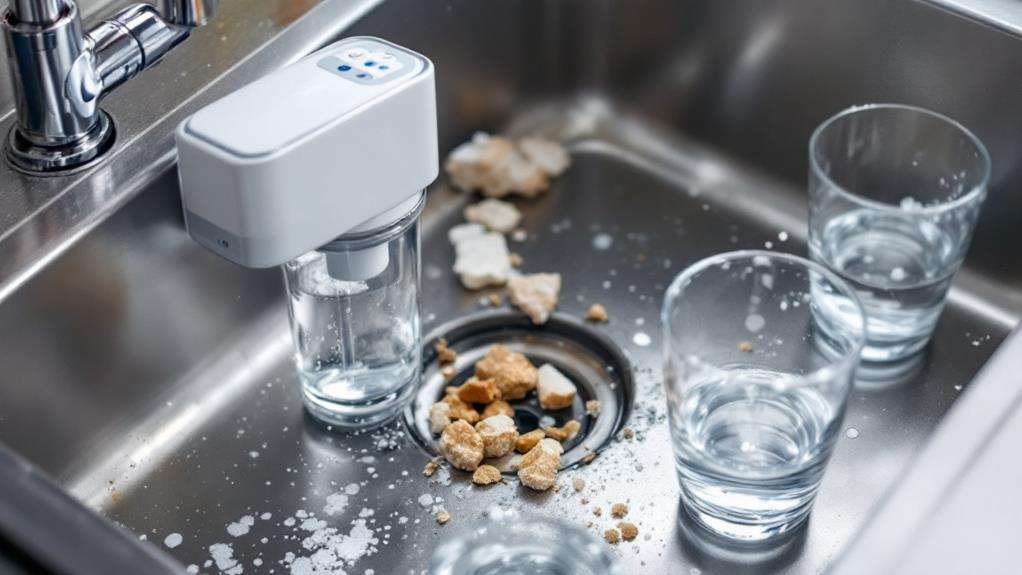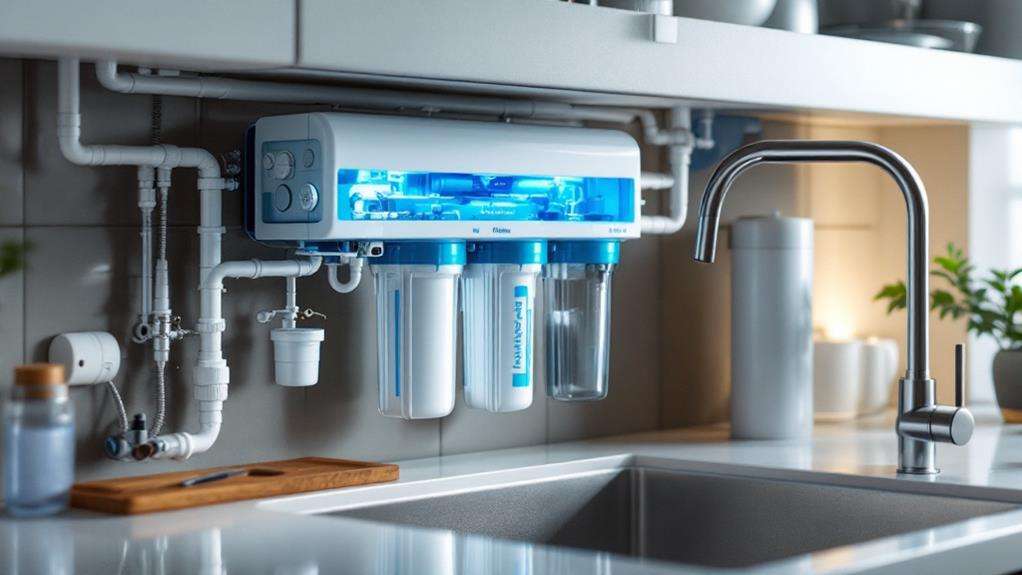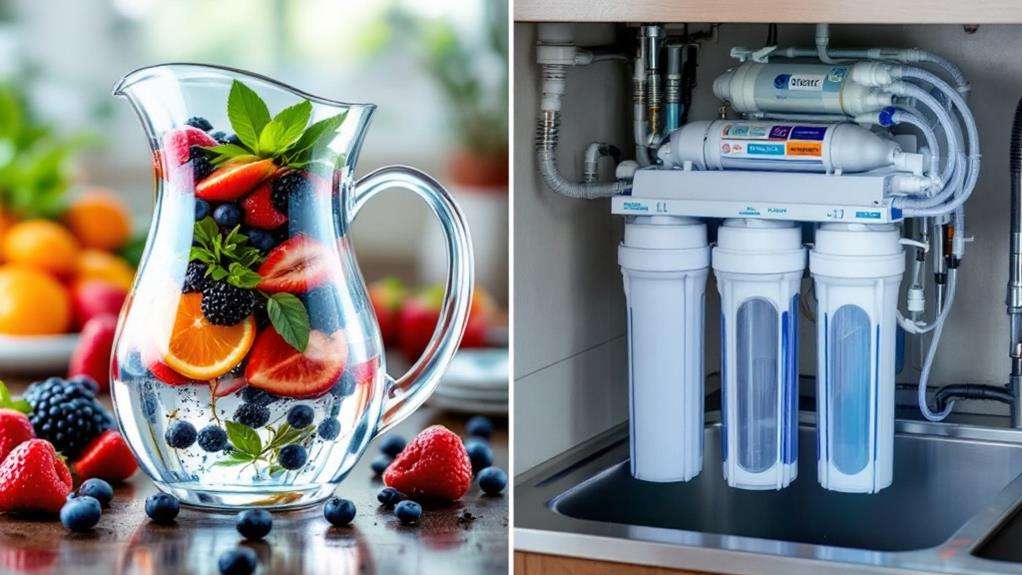Pros and Cons of Alkaline Water Filters for Home Use
Alkaline water filters for home use claim to offer health benefits like improved hydration and acid neutralization. You'll get water with a higher pH and potential antioxidant properties. However, these systems come with significant drawbacks. They're expensive to install and maintain, and scientific evidence supporting long-term health benefits is limited. You might enjoy better-tasting water, but you'll need to weigh this against the ongoing costs and potential risks, such as bacterial growth in poorly maintained systems. While some users report positive experiences, it's vital to review alternatives and consult experts before investing. Exploring the full perspective will help you make an informed decision.
Understanding Alkaline Water Filters
Curiosity about alkaline water filters has grown in recent years, but it's important to understand what they actually do. These devices use electrolysis to separate water into acidic and alkaline streams, producing water with a pH range of 8-10. However, they're not traditional water filtration systems and don't actively remove contaminants like chlorine, heavy metals, or microorganisms.
Alkaline water filters, also known as ionizers, have been associated with various health claims, such as improved hydration and neutralizing body acidity. However, these benefits aren't well-supported by scientific evidence. While some individuals report positive effects, the long-term impact of consuming alkaline water remains unclear.
When considering alkaline water filters for your home, you should be aware of their limitations in improving overall water quality. They may reintroduce some minerals into the water, but they don't address other water purity concerns. Additionally, these systems often come with higher upfront costs and require regular maintenance, including filter cartridge replacements. Before investing in an alkaline water filter, carefully weigh the potential benefits against the ongoing costs and lack of conclusive scientific support for health claims.
Benefits of Alkaline Water
Three key benefits are often associated with alkaline water consumption. First, alkaline water's antioxidant properties, resulting from its negative oxidation-reduction potential (ORP), may help combat free radicals in your body. This potential health benefit is a key reason why many people invest in alkaline water filtration systems for their homes.
Second, if you suffer from acid reflux, alkaline water might provide temporary relief by neutralizing stomach acid. While it's not a cure, it could offer some comfort for those dealing with this condition. To conclude, alkaline water contains beneficial alkaline minerals like calcium, magnesium, and potassium, which may contribute to improved hydration and overall health.
Some proponents claim that drinking alkaline water can help maintain your body's pH balance and support kidney health. However, it is crucial to note that scientific evidence supporting these claims is limited, particularly in human studies. While some animal research suggests potential benefits for athletic performance, more extensive studies are needed to validate the long-term health benefits of alkaline water consumption. As with any health-related decision, it is advisable to consult with a healthcare professional before making significant changes to your water intake.
Drawbacks of Alkaline Filtration Systems

While alkaline water filtration systems have gained popularity, they come with several drawbacks you should consider. These systems often require a considerable upfront investment, and the costs don't end there. You'll need to factor in ongoing maintenance expenses, including regular replacement of filter cartridges.
Despite the claims surrounding alkaline water's health benefits, there's limited scientific evidence to support long-term advantages. In fact, improperly maintained alkaline ionizers can potentially lead to bacterial growth, negating any purported health benefits.
Higher upfront and maintenance costs
Limited scientific evidence supporting health claims
Risk of bacterial growth in poorly maintained systems
Potential interference with medication absorption
Debated effectiveness in altering body's pH balance
It's important to note that alkaline water may interfere with the absorption of certain medications, such as antacids and blood pressure drugs. This could potentially impact your health if you're relying on these medications.
The scientific community remains divided on the ability of alkaline water to substantially alter your body's pH balance and provide substantial health benefits. Before investing in an alkaline water filtration system, carefully weigh these drawbacks against any potential advantages.
Cost Considerations
When considering an alkaline water filter for your home, you'll inevitably face significant cost considerations. The upfront expense of an alkaline water filtration system can range from $200 to $1,000 for a basic setup, which is notably higher than traditional water filters. This initial investment is just the beginning of your financial commitment.
You'll need to factor in ongoing maintenance and replacement costs for your alkaline water system. Expect to replace filters every 6-12 months, with each replacement costing between $50 and $200. The installation process may also require additional plumbing or renovation work, further increasing your overall expenditure.
While an alkaline water purification system might save you money on bottled water in the long run, the high initial cost can be a hurdle for many homeowners. To guarantee water filter longevity and effectiveness, you'll need to invest time and effort in proper maintenance and cleaning. These factors contribute to the total water filter ownership cost, which extends beyond the initial purchase price. Carefully weigh these expenses against the potential benefits before committing to a home water filtration system using alkaline technology.
Health Claims and Scientific Evidence

Beyond the financial aspects, it's important to examine the health claims associated with alkaline water filters. You've likely heard various assertions about the benefits of alkaline water, but it's necessary to understand the scientific evidence behind these claims.
While proponents tout alkaline water's ability to reduce body acidity, scientific research doesn't support this notion. Your body efficiently regulates its pH levels, making significant changes through water consumption unlikely. However, some studies suggest potential benefits in areas such as:
- Enhanced hydration
- Detoxification
- Weight loss
- Cancer protection
- Immune system support
It's pivotal to note that the evidence for these claims is limited and often inconclusive. Peer-reviewed studies on alkaline water's health benefits are scarce, with much of the existing research lacking scientific rigor or being animal-based.
The scientific community largely considers the health advantages of alkaline water unverified. More thorough, well-designed studies are needed to establish its efficacy. As you consider investing in an alkaline water filter for your home, it's essential to approach the health claims with a critical eye and base your decision on the available scientific evidence rather than unsubstantiated marketing claims.
Environmental Impact
In light of growing environmental concerns, it is crucial to evaluate the ecological impact of alkaline water filters for home use. These systems offer both benefits and drawbacks when it comes to environmental sustainability.
On the positive side, alkaline water filtration can drastically reduce your reliance on single-use plastic bottles, helping to decrease plastic waste and pollution. By using your own filtered water at home, you'll also cut down on the emissions associated with transporting bottled water. Additionally, combining alkaline water filters with reusable water containers can further enhance your eco-friendly efforts.
However, it is important to ponder the environmental costs of these systems. The production of water ionizers is energy-intensive, potentially leading to a larger carbon footprint compared to other filtration methods. You'll also need to be mindful of properly disposing of and recycling used filter cartridges to minimize their environmental impact.
Ultimately, the environmental impact of alkaline water filters depends on how you use and maintain them. By being conscious of these factors and making informed choices, you can maximize the environmental benefits while minimizing the drawbacks of this water filtration method.
Installation and Maintenance

Setting up and maintaining an alkaline water filter for your home requires careful consideration and ongoing attention. You'll need to decide whether to install a point-of-use system, such as under the sink or on your countertop, or opt for a whole-home filtration system. Regardless of your choice, you'll need to stay on top of regular maintenance to guarantee optimal performance and water quality.
Key aspects to keep in mind:
- Replace filter cartridges every 6-12 months, depending on usage
- Clean and sanitize the system regularly to prevent bacterial growth
- Be prepared for more frequent maintenance compared to other water purification methods
- Factor in ongoing costs for replacement filters and electricity
- Consider the complexity of the ionization process when preserving your system
Alkaline water filters often require more attention than simpler filtration methods like Reverse Osmosis. You'll need to be diligent about cleaning and replacing components to maintain the effectiveness of the ionization process. While the installation process may vary depending on the type of system you choose, ongoing maintenance is vital for all alkaline water filters. By staying proactive with your maintenance routine, you'll guarantee that your water filter continues to provide high-quality, alkaline water for your household.
Taste and Quality Differences
Many users find that alkaline water filters markedly enhance the taste and overall quality of their drinking water. These filters employ multi-stage filtration to remove impurities, resulting in water with higher pH levels that often tastes smoother and more invigorating than regular tap water. You'll likely notice a significant improvement in both taste and odor after installing an alkaline water filter in your home.
One of the key benefits you'll experience is the balanced acidity that alkaline water provides. This can enhance the flavor of beverages and improve food preparation by neutralizing acidic ingredients. You may also perceive a cleaner, crisper mouthfeel when drinking alkaline water, which can be particularly noticeable compared to unfiltered tap water.
The improved taste and quality of alkaline water can encourage you to drink more water throughout the day, potentially leading to better hydration. As you become accustomed to the invigorating taste of filtered alkaline water, you might find yourself reaching for it more often, especially if you previously disliked the taste of your tap water. This increased water consumption can contribute to your overall health and well-being.
Alternatives to Alkaline Filters

Alkaline water enthusiasts have several alternatives to ponder beyond traditional alkaline filters. If you're looking for clean water with balanced pH levels, consider these options:
- Reverse osmosis (RO) systems
- Livation Hydration Chamber
- Gerolsteiner sparkling water
- Baking soda addition
- Far-infrared balls
RO systems provide pure, clean water by removing contaminants, including heavy metals. While they don't specifically alkalize water, they're excellent for safeguarding water safety. The Livation Hydration Chamber adds minerals and enhances water without the need for ionizers, making it a great option for those concerned about hard water or impaired kidney function.
For a natural approach, try Gerolsteiner sparkling water, which can help balance pH levels due to its high alkalinity. If you're on a budget, adding baking soda to your water is a cost-effective way to increase alkalinity. However, consult your doctor first, especially if you have kidney disease.
Lastly, far-infrared balls can increase water pH, improve oxidation-reduction potential, and enhance water structure. Before choosing any method, consider water testing to determine your specific needs and guarantee you're addressing any water quality issues effectively.
Choosing the Right System
When it comes to selecting the right alkaline water filter system for your home, you'll need to weigh several key factors. Consider the filtration capabilities, pH level adjustment, remineralization options, and overall water quality improvement offered by different alkaline water filtration systems.
Reverse osmosis systems provide thorough water purification, removing a wide range of contaminants. However, they may also strip beneficial minerals, necessitating remineralization. If you're looking for a more affordable and convenient option, alkaline water pitchers and countertop filters might be suitable, though their contaminant removal capabilities may be limited compared to under-sink or whole-house systems.
Don't forget to evaluate long-term maintenance costs associated with replacement filters and system upkeep. This will help you make an informed decision that aligns with your budget and water quality goals.
To guarantee you're choosing the best alkaline water filter system for your specific needs, consult a water treatment specialist. They can assess your household's water quality concerns and recommend a solution that addresses your unique requirements, whether it's adjusting pH levels, improving taste, or removing specific contaminants.
